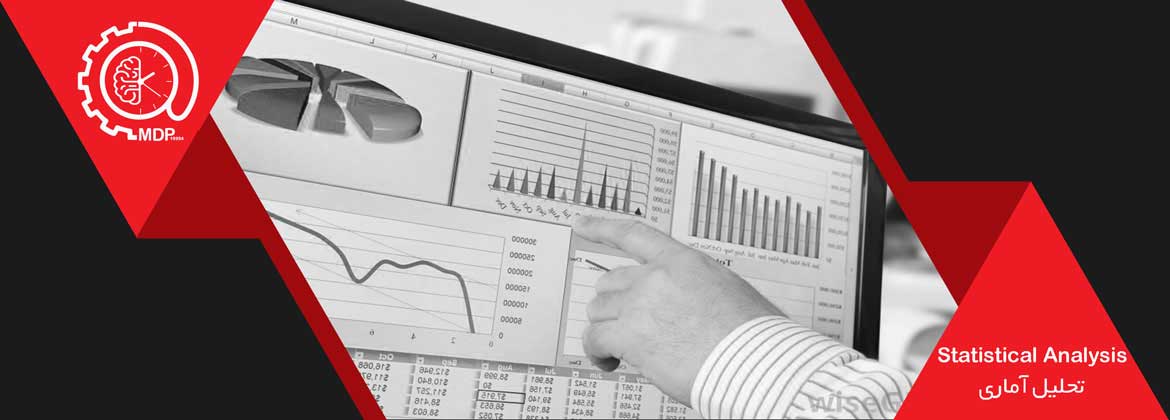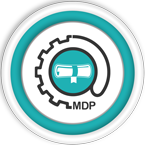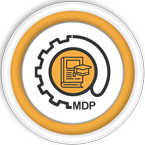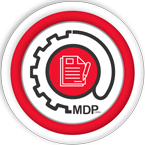- موضوعات پیشنهاد شده برای پایان نامه رشته مدیریت صنعتی :
- طراحی مدل ارزیابی عملکرد تلفیقی با استفاده از مدل تحلیل پوششی داده های فازی FDEA و کارت امتیازی متوازن BSC در سازمان
- طراحی مدل بهینه کنترل استراتژی، رویکرد تلفیقی کارت امتیازی متوازن و تاسیس فازی (BSC, FTOPSIS)
- مدل جایگزینی موجودی با استفاده از برنامه ریزی عینی فازی ( FAHP )
- مدل سازی مسئله مکان یابی شعب بانک
- طراح مدل انتخاب تامین کننده و تعیین میزان سفارش با استفاده از برنامه ریزی پویا
- طراحی مدلی جهت شناسایی و رتبه بندی ریسک در پروژه ها
- امکان سنجی پیاده سازی سیستم های اطلاعاتی یکپارچه در سازمان
- مدیریت کیفیت زنجیره تامین (SCQM) در صنعت
- استفاده از مدل زنجیره مارکوف خاکستری در پیش بینی تقاضا (برق، گاز و …)
- بالانس خطوط مونتاژ چند محصولی با استفاده از مدل ریاضی
- انتخاب سیستم برنامهریزی منابع سازمان با الگوی فرا ابتکاری الگوریتم مورچه
- استفاده از سیستم خبره فازی جهت حل مسئله مکان یابی مسیریابی
- بهبود عملکرد پروژه با استفاده از مهندسی ارزش با AHP فازی
- سیستم های سفارش دهی کنترل موجودی با استفاده از مدل های فازی
- شناسایی و رتبه بندی عوامل کلیدی موفقیت مدیریت کیفیت زنجیرهی تامین
- تدوین استراتژی تحقیق و توسعه
- سنجش توان رقابتی با استفاده از شبکه های بیزین
- ارزیابی عملکرد شرکت ها با استفاده از روش های تصمیم گیری چند معیاره خاکستری
- امکان سنجی پیاده سازی مدیریت فرآیند در سازمان
- طراحی مدلی جهت مسیریابی موجودی ها در زنجیره تامین
- طراحی مدل برنامه ریزی یکپارچه تامین ، تولید و توزیع زنجیره تامین
- ارزیابی عملکرد با مدل تلفیقی BSC , AHP
- ارزیابی و مدیریت پروژه ها با استفاده از کشف دانش و داده کاوی
- طراحی نظام جامع عملکرد با کارت امتیازی متوازن BSC
- طراحی نظام جامع عملکرد سازمان با مدل تعالی سازمانی EFQM
- طراحی نظام جامع عملکرد سازمان با رویکرد تلفیقی کارت امتیازی متوازن و مدل تعالی سازمانی ,EFQM,BSC
- ارزیابی عملکرد، تحلیل کارایی و اندازه گیری بهره وری با رویکرد تلفیقی BSC,DEA
- ارزیابی استراتژی جاری سازمان با BSC,FAHP
- ارائه مدل بهینه انتقال تکنولوژی (مطالعه موردی صنعت …)
- شناسایی و رتبه بندی موانع کارآفرینی سازمانی
- بررسی نقش و ارائه مدل روند تاثیر شش سیگمای ناب در بهبود و افزایش کیفیت محصولات
- بررسی نقش و ارائه مدل روند تاثیر شش سیگمای ناب در بهبود و افزایش کیفیت مدیریت بحران
- استفاده ازتکنیک شش سیگما و تفکر ناب در مدیریت بحران شرکت
- استفاده ازتکنیک های مدیریت کیفیت در میزان تولید شرکت
- ارائه مدل مقایسه ایی میزان تاثیر تکنیک های مختلف مدیریت کیفیت بر مدیریت بحران شرکت
- ارائه مدل کاربردی استفاده ازتکنیک های مدیریت کیفیت در مدیریت بحران شرکت
- ارائه مدل کاربردی استفاده ازتکنیک های شش سیگما و تفکر ناب در مدیریت بحران شرکت
- بررسی مزیت نسبی در صنعت
- ارائه مدل های تصمیم گیری چند معیاره Fuzzy TOPSIS و Fuzzy AHP برای تعیین صلاحیت و ارزیابی پیمانکاران و مقایسه نتایج آن ها
- طراحی مدلی جهت محاسبه ارزش عمر مشتری در سیستم های مدیریت ارتباط با مشتری با رویکرد داده کاوی
- طراحی مدل بهینه جهت ارزیابی و رتبه بندی تامین کنندگان با استفاده از تکنیک های (TOPSIS ELECTRI, PROMATI)
- طراحی مدل بهینه جهت ارزیابی و رتبه بندی تامین کنندگان با رویکرد الگوریتم ژنتیک
- ارائه مدلی جهت سنجش کیفیت خدمات سازمان ها (مدل تلفیقی برنامه ریزی آرمانی و تحلیل سلسله مراتبی GP,AHP) موردی بنیاد مستضعفان
- طراحی مدل ترکیبی (برنامه ریزی آرمانی و تحلیل سلسله مراتبی GP,AHP) جهت سنجش ساختار سیستم های کنترل کیفیت
- سنجش کیفیت خدمات الکترونیک با استفاده از مدل ای-کوال، موردی بانک
- سنجش کیفیت خدمات با استفاده از مدل سرو-کوال، موردی
- ارزیابی اثر بخشی مدیریت زنجیره تامین از طریق به کارگیری کارت امتیاز متوازن
- کاربرد داده کاوی در طراحی مجدد فرآیندهای کسب و کار (BPR)
- داده کاوی برای مدیریت ارتباط با مشتری در …
- طراحی مدل بهینه مشتری مداری در …
- طراحی مدلی جهت انتخاب بهینه تکنولوژی در … با استفاده از تکنیک های تصمیم گیری (AHP,TOPSIS,DEA)
- تحلیل ریسک اعتباری و طراحی بهینه مدل رتبه بندی اعتباری مشتریان بانک با استفاده از مدل شبکه عصبی و رگرسیون لوجیت
- مکانیابی بهینه شعب بانک یا …. (با استفاده از متد AHP، VIKOR، DEA و فازی TOPSIS ، AHP)
- شناسایی و رتبه بندی ریسک پیاده سازی پروژه CRM
- بررسی آمادگی سازمان… برای پیادهسازی مدیریت ارتباط با مشتری (CRM) با استفاده از تحلیل عاملی و AHP گروهی و منطق فازی
- مدلی جهت ارزیابی اثر بخشی مدیریت ارتباط با مشتری در بنگاه های ایرانی
- نقش مدیریت روابط با مشتری (CRM) در کسب مزیت رقابتی بازارهای خدماتی
- ارائه مدلی جهت انتخاب یک سیستم ERP مناسب با استفاده از رویکرد AHP فازی
- ارزیابی عملکرد کیفیتی سازمان …. بر اساس مدل EFQM با استفاده از تکنیک تحلیل سلسله مراتبی
- تدوین الگوی موفقیت پروژه ها با تلفیق مدل های EFQM,BSC,AHP
- پیاده سازی مهندسی مجدد فرآیندها در …
- شناسایی و تحلیل ریسک های زنجیره تامین در چارچوب تصمیم گیری چند معیاره فازی
- انتخاب سبد بهینه سهام با استفاده از الگوریتم اجتماع پرندگان
- طراحی مدلی جهت بهینه سازی سرمایه گذاری با استفاده از الگوی اجتماع پرندگان
- خوشه بندی مشتریان بانک با ارزش هرم مشتری (داده کاوی)
- داده کاوی و مدیریت ارتباط با مشتری (CRM)
- پیش بینی (قیمت سهام، نرخ تورم و …) با استفاده از داده کاوی و مقایسه با شبکه عصبی و …
- انتخاب سبد بهینه سهام با استفاده از تکنیک داده کاوی
- انتخاب سبد بهینه سهام با استفاده از شبکه عصبی مصنوعی
- انتخاب سبد بهینه سهام با استفاده از الگوریتم ژنتیک
- ارائه مدل تلفیقی مدیریت دانش و داده کاوی جهت مدیریت بهینه ارتباط با مشتری
- طراحی مدل تلفیقی تحلیل پوششی داده ها و شبکه عصبی (DEA-neural network) جهت ارزیابی کارایی و رتبه بندی واحدها
- طراحی مدل تلفیقی تحلیل پوششی داده ها و تحلیل سلسله مراتبی فازی (FAHP-DEA) جهت ارزیابی عملکرد، اندازه گیری کارایی و رتبه بندی واحدها
- ارائه مدل تلفیقی ارزیابی عملکرد بر اساس کارایی با ترکیب روش های پارامتریک (SFA,COLS) و ناپارامتریک (DEA) با کمک روش تحلیل مولفه های اصلی (PCA)
- طراحی مدلی مبتنی بر ریسک و بازده جهت ارزیابی عملکرد وکارایی
- طراحی سیستم تلفیقی مهندسی ارزش و هزینه یابی هدف جهت بهینه سازی فرآیندها
- کاربرد رویکرد داده کاوی در مدیریت بر اطلاعات مشتری در مدیریت زنجیره تأمین
- بررسی نقش داده کاوی در مدیریت دانش سازمان
- طراحی مدل ارزیابی عملکرد و کارایی به وسیله مدل ترکیبی تحلیل پوششی داده ها DEA و برنامه ریزی آرمانی GP
- استفاده از مدل SCOR (مرجع عملیات زنجیره تامین) جهت بهینه سازی زنجیره تامین
- تدوین استراتژی بهینه با مدل تلفیقی SWOT و فرآیند تحلیل شبکه ای ANP
- شناسایی و رتبه بندی قابلیت های تولید چابک در صنعت … با (متدهای MADM و فازی و تلفیقی و …)
- برآورد تقاضای نهایی (انرژی، سیمان، برق، آب، …) با به کارگیری مدل ارزیابی تقاضای …
- پیشبینی تقاضای (انرژی، سیمان، برق، آب، …) با استفاده از مدل MAED
- موضوعات پیشنهادی زنجیره تامین :
- طراحی مدل تلفیقی جهت ارزیابی تامین کنندگان در زنجیره تامین (مدل های : تحلیل سلسله مراتبی AHP، آنالیز رابطه ای خاکستری GRA و برنامه ریزی آرمانی GP)
- بهینه سازی زنجیره تامین با الگوریتم ژنتیک
- بهینه سازی زنجیره تامین با استفاده از داده کاوی (data mining)
- رتبه بندی تامین کنندگان در مدیریت زنجیره تامین با استفاده از تکنیک های تصمیم گیری چندمعیاره (معمولی و فازی نظیر : AHP و FAHP، TOPSIS و FTOPSIS، PROMATI، ELECTRI) و گزینش مدل بهینه بر اساس روش های ) COPLAND , BORDA و میانگین گیری
- اندازه گیری و سنجش چابکی زنجیره تامین با استفاده از ترکیب تئوری گراف، تحلیل سلسله مراتبی فازی و رویکرد ماتریسی
- تدوین استراتژی بهینه زنجیره تامین (با رویکرد ماتریس SOWT و تحلیل پویایی سیستم ها)
- بهینه سازی زنجیره تامین با رویکرد موجودی و توزیع غیرمتمرکز
- طراحی مدل مفهومی مدیریت زنجیره تامین چابک با بررسی مولفه های تاثیرگذار
- طراحی مدلی جهت ارزیابی عملکرد و سنجش کارایی زنجیره های تامین (تحلیل عاملی، تحلیل ساختاری، DEA و …)
- ارائه یک مدل شبکه عصبی جهت پیش بینی تقاضا در زنجیره تامین با رویکرد داده کاوی
- مقایسه روش تلفیقی عصبی–فازی با روش های اقتصادسنجی در پیش بینی تقاضا و انتخاب روش بهینه
- مقایسه روش تلفیقی عصبی –فازی با روش های سری زمانی و آریما در پیش بینی تقاضا و انتخاب روش بهینه
- بهینه سازی سود در زنجیره تامین با درنظر گرفتن محدودیت های موجود با استفاده از برنامه ریزی آرمانی (GP)
- استفاده از روش الگوریتم ژنتیک جهت پیش بینی تقاضا در زنجیره تامین
- طراحی شبکه (تولید، ذخیره سازی، حمل و نقل) و برنامه ریزی بهینه تقاضای زنجیره تامین
- کاربرد روش های شبکه عصبی و منطق فازی در بهینه سازی مدیریت زنجیره تامین
- مقایسه روش های خطی سنتی و مدل های تلفیقی عصبی فازی در پیش بینی تقاضا در زنجیره تامین
- استفاده از روش تکنیک های یادگیری ماشین جهت پیش بینی تقاضا در زنجیره تامین
- بسط الگوی داده کاوی در پیش بینی تقاضا
- بسط مدل تلفیقی طراحی شده در این تحقیق (عصبی-فازی) در رتبه بندی تامین کنندگان در زنجیره تامین و آزمون کارایی آن
- استفاده از منطق فازی در مدل جامع SCOR جهت بهینه سازی زنجیره تامین
- بهینه سازی زمان تحویل قطعات در زنجیره تامین با مدل تلفیقی طراحی شده این تحقیق (عصبی-فازی) و آزمون کارایی آن
- بسط مدل تلفیقی طراحی شده در این تحقیق (عصبی-فازی) در اولویت بندی بازارهای هدف در زنجیره تامین و آزمون کارایی آن
- طراحی مدل بهینه ارزیابی زنجیره تامین با تلفیق مدل مرجع عملیات زنجیره تامین (SCOR) و مدل تحلیل سلسله مراتبی AHP
- ارزیابی زنجیره تامین شرکت … به منظور به کارگیری سیستم های پیشرفته برنامه ریزی و اشتراک اطلاعات با مدل SCOR
- ارزیابی اثر بخشی مدیریت زنجیره تامین با استفاده از مدل کارت امتیازی متوازن (BSC) در شرکت یا سازمان
- ارزیابی اثر بخشی مدیریت زنجیره تامین با استفاده از مدل کارت امتیازی متوازن فازی در شرکت یا سازمان
- طراحی مدلی جهت بهینه سازی کانال توزیع در زنجیره تامین
- طراحی شبکه توزیع بهینه در زنجیره تامین با استفاده از رویکرد برنامه ریزی فازی آرمانی
- طراحی مدل چندهدفه فازی برای تخصیص بهینه سفارشات خرید به تامین کنندگان در یک زنجیره تامین
- طراحی یک مدل تلفیقی برای ارزیابی عملکرد تامین کنندگان و تخصیص سفارش ها با استفاده از مدل های تحلیل پوششی داده ها و برنامه ریاضی چندهدفه
- بررسی تاثیر مستقیم و غیر مستقیم یکپارچه سازی زنجیره تامین بر عملکرد سازمان ها
- بررسی رابطه تحلیل های بازار و عملکردزنجیره تامین با مدل scor
- موضوعات پیشنهادی مدیریت دانش (از مقالات بیس) :
- بررسی رابطه مدیریت دانش (قابلیت های زیرساختی و استراتژی های کسب و کار) و عملکرد شرکت ها
- بررسی رابطه استراتژی های مدیریت دانش و عملکرد شرکت ها
- مدیریت دانش زنجیره تامین
- بررسی رابطه مدیریت دانش و متغیرهای محیطی سازمان با ساختار سازمانی
- بررسی رابطه مدیریت دانش با ساختار سازمانی
- طراحی و تدوین مدلی جهت ارزیابی اثربخشی مدیریت دانش در سازمان
- رابطه مدیریت دانش و عملکرد سازمانی و عملیاتی
- بررسی نقش قابلیت های مدیریت دانش در رابطه بین استراتژی های منابع انسانی و عملکرد نوآوری سازمان
- شناسایی و رتبه بندی عوامل موثر بر پیاده سازی موفق مدیریت دانش
- ارزیابی عملکرد مدیریت دانش با استفاده از AHP یاANP
- پیش بینی امکان موفقیت مدیریت دانش با استفاده از روش های تصمیم گیری چند معیاره فازی
- شناسایی و رتبه بندی شاخص های موفقیت اجرای مدیریت دانش سازمان با استفاده از مدل PLS (2010)
- ابزارهای مدیریت دانش، ارتباطات داخلی سازمان، نوآوری و عملکرد شرکت ها
- بررسی رابطه بین مدیریت دانش، یادگیری سازمان و نوآوری در سازمان
- مقالات بیس :
- Using multiplicative neuron model to establish fuzzy logic relationships
- Fuzzy diffusion filter with extended neighborhood
- Fuzzy time series forecasting with a novel hybrid approach combining fuzzy c-means and neural networks
- A novel nonlinear programming approach for estimating CAPM beta of an asset using fuzzy regression
- Development of a framework for customer co-creation in NPD through multi-issue negotiation with issue trade-offs
- A novel approach for assessment of candidate technologies with respect to their innovation potentials: Quick innovation intelligence process
- Solving fuzzy multiple objective generalized assignment problems directly via bees algorithm and fuzzy ranking
- Integrating fuzzy DEMATEL and fuzzy hierarchical TOPSIS methods for truck selection
- A fuzzy rule based expert system for stock evaluation and portfolio construction: An application to Istanbul Stock Exchange
- Enhanced fuzzy clustering algorithm and cluster validity index for human perception
- An application of adaptive neuro fuzzy inference system for estimating the uniaxial compressive strength of certain granitic rocks from their mineral contents
- Fuzzy DIFACONN-miner: A novel approach for fuzzy rule extraction from neural networks
- A fuzzy solution approach for multi objective supplier selection
- An algorithm for the solution of second order fuzzy initial value problems
- Ergodic distribution for a fuzzy inventory model of type (s, S) with gamma distributed demand
- New developments in uncertainty assessment and uncertainty management
- The role of seed money and threshold size in optimizing fundraising campaigns: Past behavior matters!
- Using agents to parallelize a medical reasoning system based on ontologies and description logics as an application case
- A diagnosis framework for identifying the current knowledge sharing activity status in a community of practice
- An efficient genetic algorithm for solving the quay crane scheduling problem
- Hybridizing VNS and path-relinking on a particle swarm framework to minimize total flowtime
- Evaluating the integration of fuzzy logic into the student model of a web-based learning environment
- An empirical knowledge management framework for professional virtual community in knowledge-intensive service industries
- Genetic optimization of a vehicle fuzzy decision system for intersections
- Data mining using clinical physiology at discharge to predict ICU readmissions
- An adaptive approach to mining frequent itemsets efficiently
- A group trust metric for identifying people of trust in online social networks
- A genetic search of patterns of behaviour in OSS communities
- Data and knowledge visualization with virtual reality spaces, neural networks and rough sets: Application to cancer and geophysical prospecting data
- Vehicle routing problem with time windows considering overtime and outsourcing vehicles
- Decision support system for water distribution systems based on neural networks and graphs theory for leakage detection
- Palm vein recognition using adaptive Gabor filter
- Identification of trends from patents using self-organizing maps
- Forecasting nonnegative option price distributions using Bayesian kernel methods
- GRADIENT: Grammar-driven genetic programming framework for building multi-component, hierarchical predictive systems
- On the use of data filtering techniques for credit risk prediction with instance-based models
- The role of intelligent agents and data mining in electronic partnership management
- Reliability analysis of the complex mode indicator function and Hilbert Transform techniques for operational modal analysis
- Adaptive neuro fuzzy controller for adaptive compliant robotic gripper
- Robustness for a single railway line: Analytical and simulation methods
- Sequential manifold learning for efficient churn prediction
- Unsupervised and supervised learning to evaluate event relatedness based on content mining from social-media streams
- Decision support method for the design of embedded energy in autonomous microsystems
- Modelling group processes and effort estimation in project management using the Choquet integral: An MCDM approach
- Multimodal behavioral analysis for non-invasive stress detection
- Variable Neighborhood Search heuristic for the Inventory Routing Problem in fuel delivery
- Local Models for data-driven learning of control policies for complex system
- Non-dominance and attitudinal prioritisation methods for intuitionistic and interval-valued intuitionistic fuzzy preference relations
- Automatic categorisation of comments in social news websites
- Machine learning for vessel trajectories using compression, alignments and domain knowledge
- A differential evolution approach for solving constrained min–max optimization problems
- On the empirical mode decomposition applied to the analysis of brain SPECT image
- Improved multilevel security with latent semantic indexing
- Using genetic algorithm based knowledge refinement model for dividend policy forecasting
- Using Wikipedia concepts and frequency in language to extract key terms from support documents
- A network intrusion detection system based on a Hidden Naïve Bayes multiclass classifier
- Organizational factors enhancing customer knowledge utilization in the management of key account relationships (2010)
- Evolution of co-management: Role of knowledge generation, bridging
- organizations and social learning (2009)
- Knowledge Management Competence for Enterprise System Success (2010)
- A combined fuzzy MCDM approach for selecting shopping center site Railway station site selection using analytical hierarchy process and data envelopment analysi
- A generalized fuzzy approach for strategic problems Hospital site selection using fuzzy AHP and its derivatives
- A new method for ranking discovered rules from data mining by DEA (2009)
- A study of applying data mining approach to the information disclosure for Taiwan’s stock market investors (2009)
- Applying enhanced data mining approaches in predicting bank performance (2009)
- Data mining method for listed companies’ financial distress prediction (2008)
- Using neural networks and data mining techniques for the financial distress
- prediction model (2009)
- Evaluating the cross-efficiency of information sharing in supply chains (2010)
- The effect of operational slack, diversification, and vertical relatedness on the stock market reaction to supply chain disruptions (2009)
- Examining the diffusion of electronic supply chain management with external
- antecedents and firm performance: A multi-stage analysis (2010)
- The impact of business analytics on supply chain performance (2010)
- The impact of supply chain complexity on manufacturing plant Performance (2009)
- An investigation on the direct and indirect effect of supply chain integration on firm performance (2009)
- The impact of supply chain integration on performance: A contingency and configuration approach (2010)
- Data mining to improve industrial standards and enhance production
- and marketing: An empirical study in apparel industry (2009)
- To mine association rules of customer values via a data mining procedure with improved model (2010)
- Customer participation and citizenship behavioral influences on employee performance, satisfaction, commitment, and turnover intention (2010)
- Customer value anticipation, customer satisfaction and loyalty: An empirical examination (2010)
- زمینه: داده کاوی data mining
- new method for ranking discovered rules from data mining by DEA (2009)
- A study of applying data mining approach to the information disclosure for Taiwan’s stock market investors (2009)
- Applying enhanced data mining approaches in predicting bank performance: A case of Taiwanese commercial banks (2009)
- Data mining method for listed companies’ financial distress prediction (2008)
- Using neural networks and data mining techniques for the financial distress prediction model (2009)
- Integrating data mining with casebased reasoning for chronic diseases prognosis and diagnosis (2007)
- Predicting corporate financial distress based on integration of support vector machine and logistic regression (2007)
- Data mining techniques for the detection of fraudulent financial statements (2007)
- زمینه: مدیریت دانش knowledge management
- A mobile knowledge management and decision support tool for soil analysis (2009)
- How knowledge management mediates the relationship between environment and organizational structure (2010)
- Knowledge management in supply chain: An empirical study from France (2010)
- Globalization, culture, and information: Towards global knowledge transparency (2010)
- Knowledge-based sales management strategy and the grafting metaphor: Implications for theory and practice (2010)
- Knowledge management in small and mediumsized enterprises (2008)
- Performance implications of knowledge management processes: Examining the roles of infrastructure capability and business strategy (2011)
- General perspectives on knowledge management: Fostering a research agenda (2011)
- The knowledge management strategy and its effect on firm performance: A contingency analysis (2010)
- An effectiveness measurement model for knowledge management (2009)
- Information management as an enabler of knowledge management maturity: A South African perspective (2010)
- Knowledge management perspective on e-learning effectiveness (2009)
- Linking improved knowledge management to operational and organizational performance (2009)
- Strategic human resource practices and innovation performance — The mediating role of knowledge management capacity (2009)
- The research on the critical success factors of knowledge management and classification framework project in the Executive Yuan of Taiwan Government (2009)
- Applying knowledge management to project marketing in a demanding technology transfer project: Convincing the industrial customer over the knowledge gap (2009)
- Knowledge management adoption and assessment for SMEs by a novel MCDM approach (2010)
- Choosing knowledge management strategies by using a combined ANP and DEMATEL approach (2008)
- Evaluating knowledge management capability of organizations: a fuzzy linguistic method (2009)
- Knowledge management systems and organizational knowledge processing challenges: A field experiment (2009)
- Measuring knowledge management performance using a competitive perspective: An empirical study (2009)
- Success factors of knowledge management in temporary organizations (2010)
- Knowledge transfer in project-based organizations: an organizational culture perspective (2008)
- Tacit knowledge and knowledge conversion: controversy and advancement in organizational knowledge creation theory (2009)
- Using a hybrid MCDM model to evaluate firm environmental knowledge management in uncertainty (2011)
- Evaluating knowledge management capability of organizations: a fuzzy linguistic method (2009)
- knowledge management approach to organizational competitive advantage (2009)
- Knowledge Management Tools, Inter-Organizational Relationships, Innovation and Firm Performance (2010)
- Modelling decision making in fund raising management by a fuzzy knowledge system (2009)
- System perspective of knowledge management, organizational learning, and organizational innovation (2010)
- Using the fuzzy multi-criteria decision making approach for measuring the possibility of successful knowledge management (2009)
- Evolution of co-management: Role of knowledge generation, bridging organizations and social learning (2009)
- Knowledge Management Competence for Enterprise System Success (2010)
- Knowledge Management Competence for Enterprise System Success (2010)
- Organizational factors enhancing customer knowledge utilization in the management of key account relationships (2010)
- The competency levels of school principals in implementing knowledge management strategies The views of principals and teachers according to gender variable (2010)
- Selecting knowledge management strategies by using the analytic network process. Expert Systems with Applications (2007)
- The effects of information technology on knowledge management systems (2008)
- زمینه: زنجیره تامین supply chain
- Rough data envelopment analysis and its application to supply chain performance evaluation (2009)
- Knowledge management in supply chain: An empirical study from France (2010)
- Performance measurement of supply chain management: A balanced scorecard approach (2007)
- Competition and cooperation in a single-retailer two-supplier supply chain with supply disruption (2010)
- Seller–buyer models of supply chain management with an asymmetric information structure (2010)
- Coordinating pricing and inventory decisions in a multi-level supply chain:
- A game-theoretic approach (2011)
- A game theory approach in seller–buyer supply chain (2009)
- Game-theoretic approach to simultaneous configuration of platform products and supply chains with one manufacturing firm and multiple cooperative suppliers (2010)
- زمینه: ارزیابی عملکرد، کارایی، اثربخشی، بهره وری PERFORMANCE
- ‘Board of directors’ size and performance in the banking sector(2009)
- Performance implications of knowledge management processes: Examining the roles of infrastructure capability and business strategy (2011)
- The knowledge management strategy and its effect on firm performance: A contingency analysis (2010)
- Critical success factors in business performance management—Striving for success (2008)
- Linking improved knowledge management to operational and organizational performance (2009)
- Measures and evaluation for environment watershed plans using a novel hybrid MCDM model (2010)
- Application of fuzzy DEMATEL to develop a cause and effect model of municipal solid waste management in Metro Manila (2009)
- An exploration of relationships between environmental practice and manufacturing performance using the PLS path modeling (2009)
- Using FANP approach on selection of competitive priorities based on cleaner production implementation: a case study in PCB manufacturer (2008)
- Knowledge Management Tools, Inter-Organizational Relationships, Innovation and Firm Performance (2010)
- Performance evaluation of extension education centers in universities based on the balanced scorecard (2011)
- Using a novel conjunctive MCDM approach based on DEMATEL, fuzzy ANP, and TOPSIS as an innovation support system for Taiwanese higher education (2010)
- Measures and evaluation for environment watershed plans using a novel hybrid MCDM model (2010)
- A value-created system of science (technology) park by using DEMATEL (2009)
- Selecting management systems for sustainable development in SMEs: A novel hybrid model based on DEMATEL, ANP, and ZOGP (2009)
- The sustainability balanced scorecard as a framework for selecting socially responsible investment: An effective MCDM model (2009)
- A MCDM approach for sourcing strategy mix decision in IT projects (2010)
- Benchmarking firm performance from a multiple-stakeholder perspective with an application to Chinese banking (2010)
- Multiple goals and ownership structure: effects on the performance of Spanish savings banks (2008)
- pening the black box of efficiency analysis: an illustration with UAE banks (2009)
- an integrated DEA and balanced scorecard approach (2008)
- Association of DEA super-efficiency estimates with financial ratios: Investigating the case for Chinese banks (2011)
- Predicting Japanese bank stock performance with a composite relative efficiency metric: a new investment tool (2010)
- A modified super-efficiency DEA model for infeasibility (2009)
- Relating the perspectives of the balanced scorecard for R&D by means of DEA (2009)
- Rough data envelopment analysis and its application to supply chain performance evaluation (2009)
- A fuzzy MCDM approach for evaluating banking performance based on Balanced Scorecard (2009)
- Application of TOPSIS in evaluating initial training aircraft under a fuzzy environment (2007)
- Extended VIKOR method in comparison with outranking methods (2007)
- A fuzzy AHP and BSC approach for evaluating performance of IT department in the manufacturing industry in Taiwan (2008)
- Information technology project evaluation: An integrated data envelopment analysis and balanced scorecard approach (2010)
- A fuzzy DEA/AR approach to the selection of flexible manufacturing systems (2008)
- Performance measurement of supply chain management: A balanced scorecard approach (2007)
- R&Dproject evaluation:An integrated DEA and balanced scorecard approach (2008)
- Performance evaluation of Turkish cement firms with fuzzy analytic hierarchy process and TOPSIS methods (2009)
- Evaluation of credit risk based on firm performance (2010)
- Impact of intellectual capital on organisational performance (2009)
- Increasing the Intellectual Capital in Organization: Examining the Role of Organizational Learning (2010)
- Intellectual Capital: apital: Perceptions of Productivity and roductivity Investment (2011)
- Construction and factorial validity of the intellectual capital scale (2010)
- How to measure human capital? A new scale to measure intellectual capital (2009)
- Intellectual capital and business performance in the pharmaceutical sector of Jordan (2010)
- The impact of strategic orientation on intellectual capital investments in customer service firms (2008)
- Does intellectual capital mediate the relationship between HRM and organizational performance (2009)
- Intellectual Capital and Firm Performance in Australia (2010)
- Impact of intellectual capital on organisational performance. An empirical study of companies in the Hang Seng Index (2009)
- Intellectual capital performance of financial institutions in Malaysia (2009)
- Model of Organization’s Intellectual Capital Measurement (2010)
- Human capital disclosure and management practices (2008)
- Intellectual Capital of Enterprises in Thailand: Measurement Model by Baysean Network Algorithm (2008)
- زمینه: استراتژی سازمان
- Using the analytic network process (ANP) in a SWOT analysis – A case study for a textile firm (2007)
- Regional energy planning through SWOT analysis and strategic planning tools. Impact on renewables development (2007)
- A Swot analysis of HACCP implementation in Madagascar (2010)
- Competitive advantage analysis and strategy formulation of airport city development The case of Taiwan (2011)
- A SWOT analysis of environmental management practices in Greek Mining and Mineral Industry (2010)
- SWOT analyses of the national energy sector for sustainable energy development (2009)
- Regional energy planning through SWOT analysis and strategic planning tools. Impact on renewables development (2008)
- Selection of optimum maintenance strategies based on a fuzzy analytic hierarchy process (2007)
انواع ویراستاری مقاله علمی - researchgate - استخراج مقاله
















